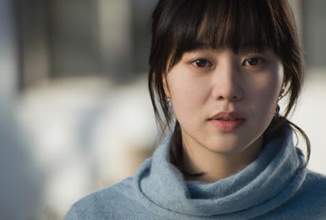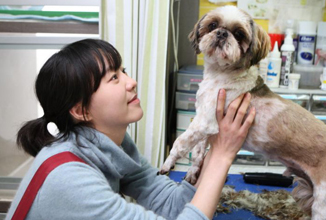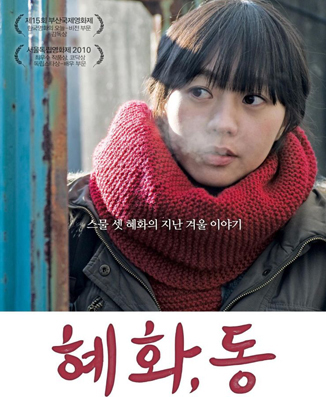Synopsis:
Hye-hwa (Yoo Da-in) leads a quiet life working as an assistant in a veterinary practice, her inability to refrain from trying to rescue abandoned dogs in the area resulting in her home being virtually over-run with canines she's saved. While setting up a cage for yet another dog, she is confronted by Han-soo (Yoo Yeon-seok), her ex-boyfriend from several years earlier, who tells her that their child - that they'd previously been told had died shortly after birth - is still alive and was, in fact, adopted behind their backs.
Producing adoption documents to substantiate his claims along with a photograph of their baby girl taken when she was born, Han-soo begs Hye-hwa to see her daughter just once, even if it's only from afar, and though initially refusing to listen to anything he has to say, and really wanting to have nothing to do with him whatsoever, Hye-hwa nonetheless cannot wipe Han-soo's protestations from her mind...
Review:
Within Hye-hwa and Han-soo's story, Re-encounter is for the most part a dark and beautifully bleak affair that serves as an in-depth dissection of grief and guilt, deftly detailing the differing manner in which each of the two main characters deals with what life has thrown at them (and continues to force them to go through), both in the lead up to the birth of their daughter and subsequent to her supposed death:
Hye-hwa has erected a huge metaphorical wall between her feelings and emotions and the outside world, and while, on the surface at least, she still exudes a noticeable effervescence (being both friendly to, and funny with, those she's close to) that side of her personality largely appears as more of a 'ghost' of the girl she once was - a veil, if you like, that she uses to cover what she's really feeling, rather than being any kind of a window into her mind and heart.
She is, in many respects, emotionally broken and so down on herself (and life) that she almost wallows in the depths of despair - it ultimately being easier for her to just exist (virtually giving up on life, hopes and dreams) than to try to find the impetus to pull herself through the pain of her past and move towards a brighter future.
However, her inability to refrain from trying to rescue (and often look after) every abandoned dog she can find, as well as her enjoyment of being a mother figure to her boss' young child, positively screams of her subconscious desperation to express the maternal instincts she was never given the chance to use to nurture and protect her own daughter, and of the regret she feels to her core at not having been allowed to become the mother she so wanted to be.
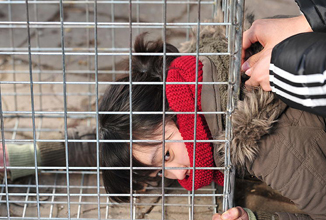 |
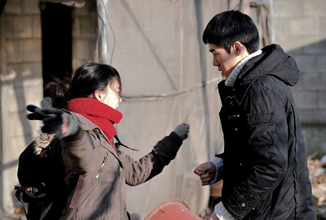 |
Conversely, Han-soo's feelings (both past and present) are utterly infused with guilt resulting from his decision to run away from his relationship with Hye-hwa while she was pregnant, and the fact that he, therefore, wasn't there for her when she needed him most - instead (almost inadvertently) leaving her to deal with the news of the loss of their daughter on her own.
In the subsequent years, he has turned the blame for the entire situation in on himself and his focus has become an increasingly desperate search for a way to ultimately make things right and finally help Hye-hwa, as he feels he always should have. His discovery of the adoption documents and photograph instantly provides him with what he believes is a way to do just that, and (if successful) will allow him the chance (no matter how slim) of securing a happy future with Hye-hwa in the process.
However, neither Hye-hwa nor Han-soo are even close to aware of the depth of the scars the other has and the question gradually becomes whether Hye-hwa will, in some respect, forgive Han-soo and allow him to help her reconnect with their daughter - thereby moving her from her (albeit negative) comfort zone - or if she will continue to shun him and destroy his chance of redemption once and for all.
Throughout Re-encounter, the predominance of run-down and dilapidated areas (both the places Hye-hwa frequents in her search for unloved animals, and even her home surroundings) stand as a mirror to her very mind - so lost, as she is, in the pain of the past that it's virtually all she cares about and all that she sees, with everything else being allowed to crumble and fall apart.
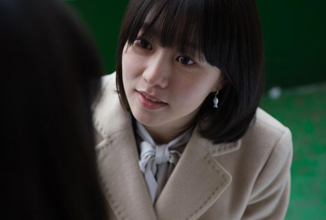 |
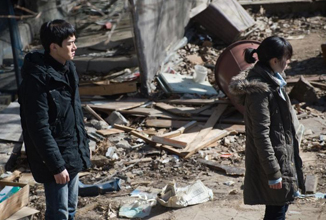 |
With the narrative centering on as closed an individual as Hye-hwa, it will likely come as next to no surprise that miscommunication and misunderstanding are rife in Re-encounter, and with next to none of the characters, save Han-soo, saying what they really feel, and often saying next to nothing at all (Hye-hwa choosing to ask her mother questions about the alleged adoption of her daughter while she is asleep, standing as one example), the ultimate disclosure of the true state of play is never guaranteed, from a viewer's point of view.
This, combined with an intelligent, well written and deftly realised plot ensures that Re-encounter neither pulls any punches nor disappoints in any respect, ultimately being all the stronger for the decision to use tiny visual clues to point to what's going on in Hye-hwa's mind and fairly minimal dialogue, rather than contrived exposition.
As we watch Hye-hwa repeatedly cut her fingernails and collect them in a little pill box, we are initially unclear as to her motivation, but no sooner do we realise the significance of what she painted on them beforehand than we completely understand just what she is really cutting and locking away.
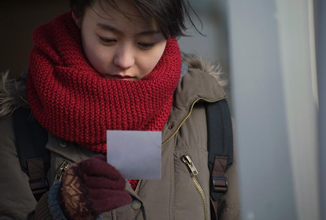 |
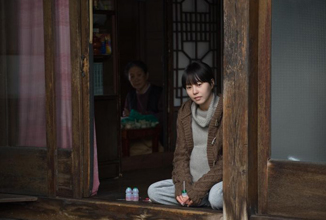 |
Director Min Yong-geun repeatedly directs Re-encounter to further accent and underline just how closed an individual Hye-hwa is, with close, intimate (and sometimes almost intrusive) framing focusing on this girl who hides everything inside, leaving viewers feeling that her decision not to share is aimed as much at them as at the characters in her life. While this idea is visually contrasted with wide angle shots at a distance (for example, Hye-hwa watching the little girl she believes might be her daughter through binoculars from a distant car; and the filming of Han-soo's conversation with the child's adoptive parents from outside the house where it's taking place, without dialogue), these scenes 'from afar' also reflect the fact that nothing here is spelt out or given freely but all is there nonetheless, for those who choose to look a little deeper.
Cast:
The decision to cast rather lesser known actors in the roles of Hye-hwa and Han-soo, and avoid big name stars, works like an utter charm in Re-encounter:
Yoo Da-in (as Hye-hwa) gives an incredible performance throughout and inhabits her character so completely that it repeatedly feels like we are watching a real-life individual, rather than a fictional characterization. Of the two main characters, Hye-hwa is given a lot more depth than Han-soo, but since she is far more the main focus of the narrative, that's exactly as it should be.
While Han-soo's character is less fleshed out than that of Hye-hwa, Yoo Yeon-seok nonetheless manages to make the role totally his own. There is a noticeable chemistry between the two that not only raises the level of realism present in the narrative but also underlines the believability of their love, pain and loss.
The rest of the cast play largely supporting roles, but each gives an accomplished performance nonetheless.
Main Cast:
Yoo Da-in, Yoo Yeon-seok, Park Hyeok-kwon, Kim Joo-ryeong, Choi Hee-won, Jeong Jae-min
Summary:
A dark and beautifully bleak affair, Re-encounter is a dissection of grief, guilt and regret that ultimately asks if it really is darkest before the dawn.
|


